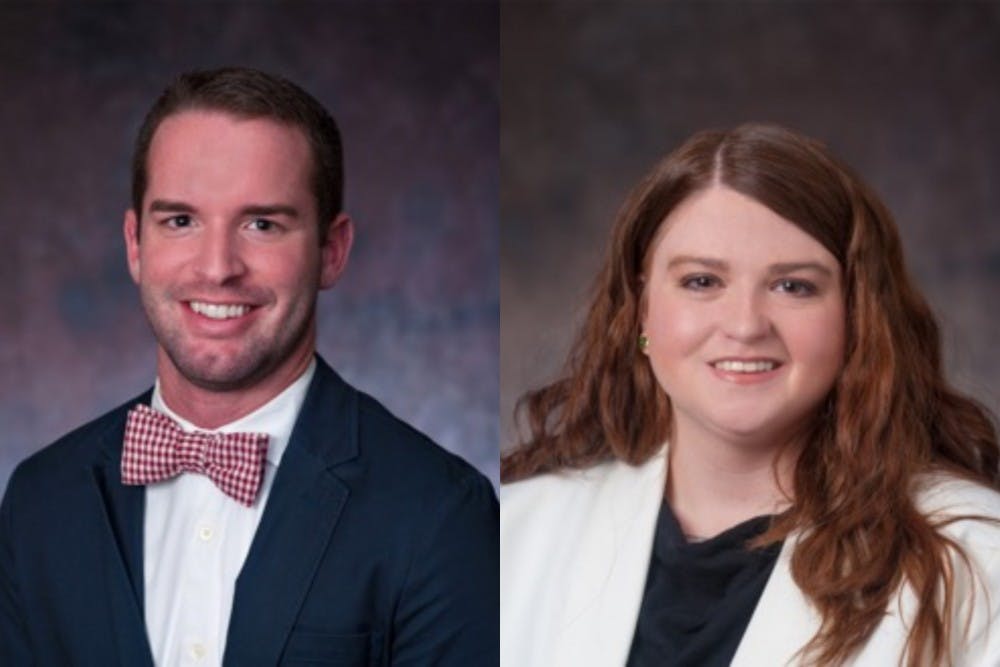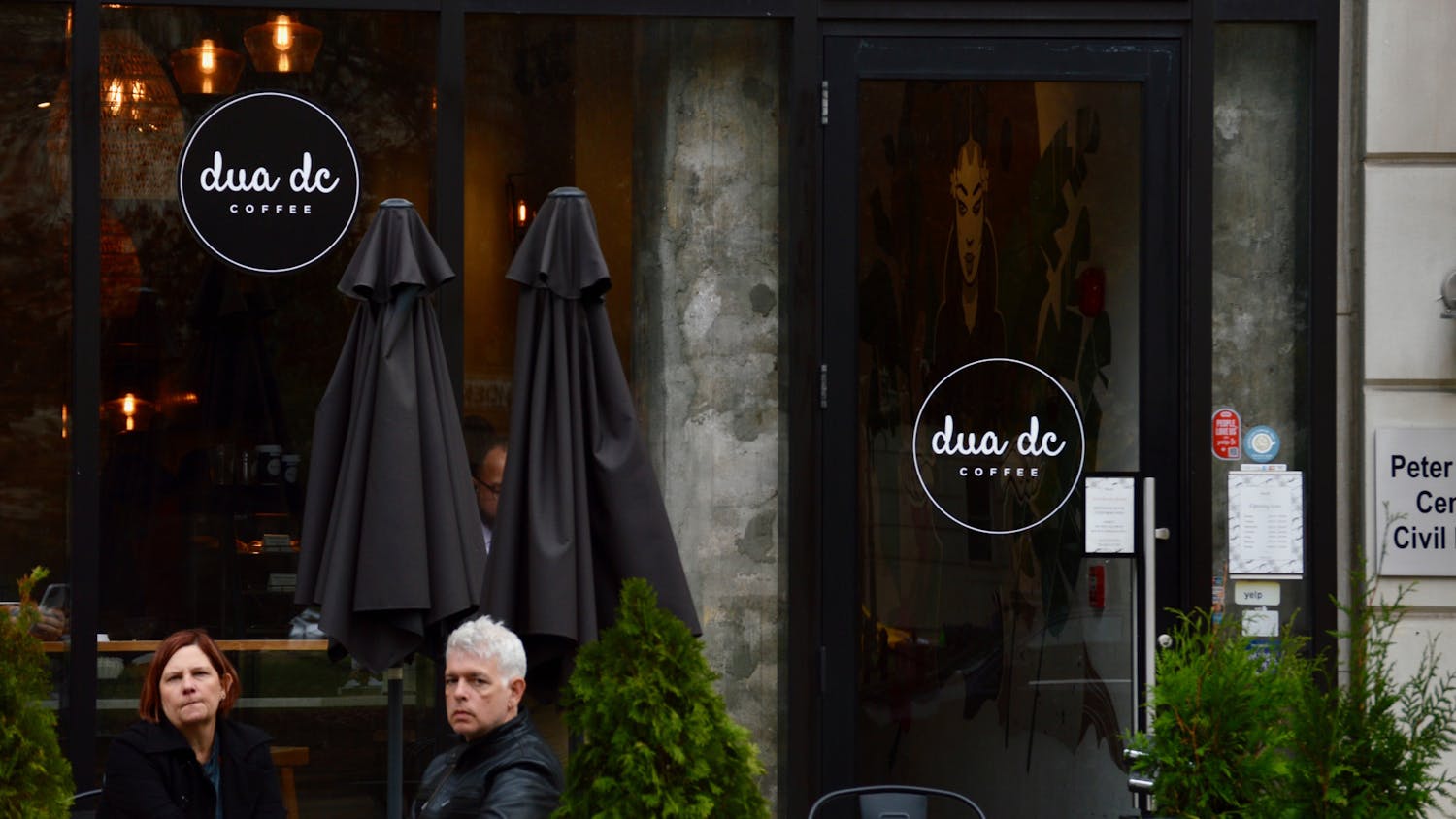Richard Duncan was walking near his apartment in northwest D.C. on June 1 when suddenly, a person in a car driving past him yelled “F---!” and threw a plastic bottle at him.
Duncan, a gay man, had moved to the District three years ago. While he’d never had a bottle thrown at him before, he said it wasn’t the first hateful incident he’d experienced.
“That was a really hurtful moment because D.C. is now what I [consider] my home,” said Duncan, AU’s Complex Problems Program and University College manager. It was more common for people to yell slurs at him as he walked down the street, he said in an email.
The hate-fueled experience was juxtaposed by the Capital Pride Parade that happened a week later, Duncan said. There, he proudly marched beside his boss, Jessica Waters, the dean of Undergraduate Education and vice provost for Academic Student Services.
“Having 70 of my colleagues, including my boss and my boss’ boss, all present, waving rainbow flags, shouting, being happy and trying to put a physical presence for AU in a Pride event was a really amazing feeling,” Duncan said.
The University’s participation in Capital Pride 2019 was made possible by the LGBTQ+ Faculty and Staff Affinity Group. Even though the group has only been around for a year, it offers a community where LGBTQ faculty and staff can connect, network and aim to achieve changes in policies that affect them, Duncan said.
The group formed as a result of the University’s Inclusive Excellence Plan, which was implemented by AU President Sylvia Burwell to diversify and create a more inclusive campus. It’s overseen and supported by Human Resources and the LGTBQ+ Coordinator in the Center of Diversity and Inclusion. Internally, the group is run by co-chairs Stephanie Bortruex and Duncan.
The official mission of the LGBTQ+ Faculty and Staff and Affinity Group is to “facilitate opportunities to serve, celebrate, empower and connect our intersectional and diverse community to support professional and personal development,” according to its webpage. The group’s attendance at the parade helped it achieve its goals.
“I’m very proud of what we accomplished there,” said Bortruex, who is also the financial operations specialist at the University library. “It was fantastic to see students, alumni, faculty, staff and upper administration all march together for one cause and that cause being love.”
A Long Time Coming
When Mike Murphy, the senior administrative assistant for the sociology department, began working at the University about one year ago, it surprised him that a formal affinity group did not already exist on AU’s campus.
“It’s long overdue,” Murphy said. “I’m just so happy to be here at the time that it’s coming together. It’s interesting, Stonewall was 50 years ago this [June], and we are just now getting organized here on campus.”
Years before the official affinity group formed on the University’s campus, about 160 LGBTQ faculty and staff used an optional email listserv to learn more about campus events, socials and happy hours that would be hosted amongst themselves, Duncan said. The only problem, he said, was that it lacked central leadership.
The Two-Year Action Plan for Inclusive Excellence changed this with its goal to develop affinity-based groups that deepen the relationships between faculty, staff, administrators, students and alumni, especially those who are members of historically underrepresented minorities.
The creation of the LGBTQ+ Faculty and Staff Affinity Group has been positively received by many of the members, including Jordan Lantz, the assistant director of Parent Leadership and Engagement in the Office of Development and Alumni Relations.
“It’s really important for me to know, as someone who is employed by AU, that I am respected, and I am included, and I am looked at as equal,” said Lantz, who identifies as a gay man. “Having this group tells me that AU is willing to invest and care about that identity and allow me to come to work, be my whole self and not have to hide something.”
The Group’s Beginnings and Present
The LGTBQ+ Affinity Group began with a social on the McKinley Roof Terrace in August 2018.
“That was my first introduction to it,” said Bortruex, who identifies as queer. “I just heard that there was a party for LGBTQ people on the roof of the SOC building, and of course I wanted to come. When I got there, I saw the great potential this could be.”
Murphy did not know what to expect when he attended a lunch gathering in the Mary Graydon Center for the group months later.
“I was thinking, ‘Who will be there? Will it be anybody I know? Will it be people who are way younger than me?’” said Murphy, a gay man. “It turned out to be folks from all across the University, from all the departments, from all different age cohorts...It’s good to just be there for one another, to be affirming: ‘Yes, you’re not the only one.’”
Since then, the group has grown its email listserv to about 190 faculty and staff, according to Bortruex.
Andrew Toczydlowski, the director of Student Development and Services in the Kogod School of Business, echoed the idea of not being alone and having a support system after joining the LGTBQ+ Faculty and Staff Affinity Group.
“Sometimes, we get very siloed in the work that we are doing in our individual units around campus, and so it’s nice to know there are other members of our community out there,” said Toczydlowski, a gay man. “I know that if I ever sent an email over that listserv that said ‘Hey, does anyone want to grab lunch today? I am feeling kind of down and need a boost of motivation,’ I’d get 10 replies within five minutes.”
Ian Poquet, the senior administrative assistant in the College of Arts and Sciences’ Health Studies program, said he appreciates the role the group plays on campus, but said the group is still learning to understand itself.
“Since it’s just the beginning, we don’t know what the limit is, meaning we are trying to reach out to students, staff [and] faculty. We are doing events to make sure that everybody knows about us,” Poquet, a gay man, said. “I guess that with time we’ll start finding our way and knowing exactly what things we can offer.”
Moving Forward
The LGBTQ+ Faculty and Staff Affinity Group plans to host more than 20 different events and programs this year. Among them is a mentorship program for LGTBQ faculty and staff to connect with LGBTQ students.
The program would allow for faculty, staff and students to discuss issues that are important to them, including but not limited to the intersectionality of multiple aspects of their identities. The group hopes to have the program up and running in fall 2019.
Naomi Moland, AU’s Professorial Lecturer in the School of International Service, emphasized the importance of the affinity group aiding LGBTQ students who need it.
“Another thing we talked about, too, was the importance for the students to see that there are LGBTQ faculty and staff, just so that students are aware of that presence on campus…and can find support,” Moland, a lesbian woman, said.
Moland received her undergraduate degree from Tufts University in 2001 and still remembers a moment with a professor that impacted her. The professor invited Moland to an event at his house where another professor would be coming with her wife.
“I remember that moment very distinctly because I didn’t know any faculty that were LGBTQ,” Moland said. “I wasn’t out at the time — I would come out a couple of years later myself — but it was striking to me. Even though people never told me that gay people can’t be professors, it struck me. I think it was a moment for me realizing the range of things that obviously LGBTQ people can do.”
The LGBTQ+ Faculty and Staff Affinity Group may only be coming up on their first anniversary, but after the success of the Capital Pride march, Duncan is looking forward to the future.
“We are moving in a really positive direction,” Duncan said. “I think the support that’s across campus for the affinity groups, for my personal work and for me as an individual is what kept me here.”
smirah@theeagleonline.com





